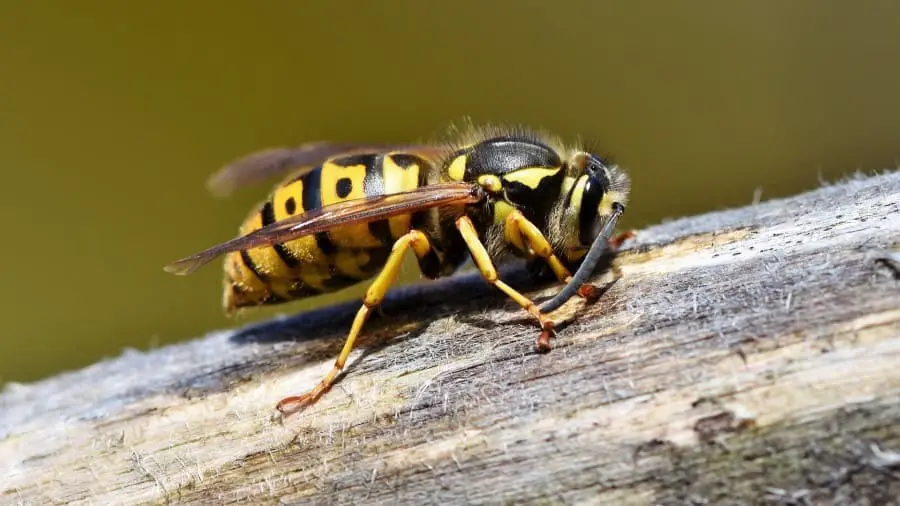
Wasps are one of those bugs that you’d hate so much that you’d just want to feed them to your chameleon. Chameleons are omnivores that eat almost anything in the world but their diets consist of mostly bugs. Does this make wasps a good choice to create more variety in your chameleon’s diet?
Chameleons can eat wasps just fine. Hymenopterans like bees and wasps are common food for chameleons in the wild. They aren’t that picky with food because they eat for the sake of survival. Feeding your chameleon wasps isn’t as dangerous as you would think.
Wasps may be deadly and annoying but in the face of a chameleon, they are nothing but dinner to them. If you plan on feeding your chameleon a wasp or two now and then, it is perfectly fine to do so. With that said, why do chameleons eat wasps if they are so dangerous?
Why Do Chameleons Eat Wasps?
Chameleons are labeled as omnivores as they can eat most of anything in the wild as long as it doesn’t kill them. They are also called “opportunistic eaters” by the scientific community due to this fact.
In the wild, there is an abundance of wasps, so you can bet that chameleons would have eaten them at some point in their lives. When domesticated in an enclosure, what a chameleon eats will all depend on what the owner feeds it.
Chameleons won’t get picky and stop eating because they are wired for survival. They will eat almost anything you throw at them. This doesn’t mean they can just survive on wasps though. Wasps are so light and with so many undigestable parts that they pose very little nutritional value on their own.
This is why wasps should only be a snack now and then, they should not replace a staple food. That being said, it doesn’t mean that wasps don’t have any benefits though as I’ll explain…
The Benefits of Feeding Wasps to Chameleons
Wasps have very little nutritional value on their own due to their light body structure. With that said, it doesn’t mean they don’t have any benefits at all.
Here are a few benefits your chameleon can enjoy when eating wasps.
Transferred Nutrition
Wasps in all species are hunters in general. This means that they are very good at hunting and they eat a wide variety of food as well. They are also omnivores who feed on vegetarian food and the meat of an animal’s body as well.
This means that wasps are packed loaded with the nutrients from eating other lifeforms even if they are lacking in nutrition when eaten alone. Transferring nutrition is so much easier through these insect mediums when compared to directly feeding a chameleon.
Some vitamins like Vitamin A are usually transferred in their dormant form which doesn’t do much for the body. They require a process in the body into an active form where much of it gets discarded anyway.
However, wasps can activate a dormant vitamin, which makes the process more efficient. Chameleons can just eat the wasp and get the vitamins immediately through digesting them.
Better Potty Experience
These annoying and deadlier cousins of bees have many parts of their bodies that can’t be digested by the body. With that said, this means that they can be used by a chameleon in a way fiber is used for digestion.
Fiber is a form of indigestible carbohydrate that has the sole purpose of pushing out the contents of your digestive tract to smoothen out the journey. Without it, chameleons will get indigestion in the form of impaction.
Impaction is a very common condition that happens in reptiles. It causes the digestive tract to get stuck which will then allow the undigested food to grow pathogens.
This can cause sepsis which is deadly to chameleons. Since wasps have indigestible parts that act like fiber, they can also push out the contents of a chameleon’s stomach to improve overall intestinal health.
Besides, who doesn’t want a better experience in the potty? Since wasps are such dangerous insects to humans, they surely must pose a threat to chameleons right?
Any Danger When Feeding Wasps to Chameleons?
No, not at all. If you are feeding right-sized chameleons with wasps, they are virtually harmless. Wasps do have stingers which can cause incredible pain.
However, these stingers need to be activated for them to pose any threat to a chameleon. Not only that, but a wasp won’t be able to react fast enough to even sting the chameleon.
A chameleon’s tongue is considered the fasting thing in the world being able to travel 100 miles within an eighth of a second. The wasp will be eaten way before the chameleon even opens its mouth.
Chameleons have quite some experience eating similar things due to evolution as well. They would have developed some form of method to completely avoid being stung while eating certain insects.
How About Poison?
I hear you ask about the poison on the stingers of wasps. You’d be correct to say that a chameleon could die to a poisonous sting on the outside, but as a food, it doesn’t matter.
The poison found on the tip of a wasp’s stinger is protein-based. Yes, they will kill you if injected into the bloodstream through the skin, but if dropped straight into the stomach they will be instantly denatured by the stomach enzymes.
The only real risk involves the size of a wasp. Some chameleons are really small and stay small for the rest of their lives. Feel free to check out this article if you want to know more about chameleons that stay small throughout their lives.
Wasps are some of the largest insects out there. This means that not all chameleons can eat them without the risk of dying. Imagine eating a cow’s bone in one bite, even you won’t be able to without the risk of choking or being pierced by the bone.
As long as you are feeding wasps to the right size of chameleons, this isn’t an issue at all.
Conclusion
Chameleons can eat wasps just fine. Wasps are found in abundance in the wild so it isn’t a surprise to know that a chameleon would have eaten some in their lifetime.
Moreover, wasps have some benefits along the way as well. However, wasps are on the low side when it comes to nutrition by themselves but, they are a great medium to transfer nutrition.
On top of that, they also act in a way similar to fiber. Wasps are dangerous if they manage to sting the chameleon, but it will rarely ever happens.
Chameleons can gobble these wasps up as fast as lightning. Before the wasp can even act, they would have already been dead. Just make sure you don’t feed a wasp that is bigger than your chameleon though.
Small chameleons can choke or get pieced very easily due to the difference in size. Now that I’ve told you this, I know exactly how to deal with those pesky wasps flying around my garden.

